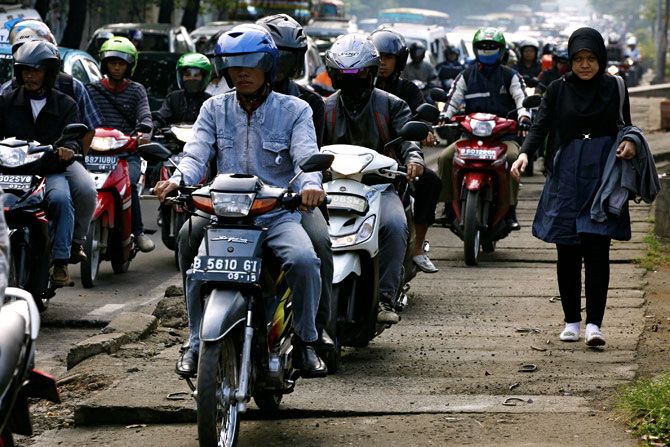Despite Jakarta’s horrendous traffic, very few people opt to walk instead of drive or ride (even though average vehicle speeds often slow to near walking speed during peak traffic). That’s because the Indonesian capital is incredibly unfriendly to pedestrians, with usable sidewalks a rare sight and vehicle-centric spatial planning making even many short walks incredibly inconvenient.
So it’s no surprise to hear that Jakartans are below-average ambulators. But according to a new study by Stanford researchers, all of Indonesia has a serious walking problem. Based on accelerometers step counter data from hundreds of thousands of mobile phones from around the world, people in Indonesia take the fewest average steps per day of any country reviewed by the researchers.
Their study, titled, “Large-scale physical activity data reveal worldwide activity inequality” was recently published in the esteemed science journal Nature and aimed to give a broader geographic data-based assessment of the links between physical activity and obesity.
According to the study’s data, the country in which people took the largest number of steps per day on average was Hong Kong with 6,880 (correction: Hong Kong is obviously part of China and not a separate country, but it was listed as such in this study). Indonesia, which came in last out of the 46 countries ranked, averaged 3,513 steps per day.
China was second with 6,189 steps per day, Singapore came in ninth with 5,674, Australia came in 28th with 4,914, the Philippines in 43rd with 4,008 and, in 45th place and just above Indonesia, Saudi Arabia with 3,513. (You can see the complete list of country step data here).
Of course, that data only represents an average of all the users in each country. One of the most intriguing finds the Stanford researchers made was that, in countries with little obesity, people mostly walked a similar amount per day, but in countries with big gaps between people who walked a lot and those who walked very little, obesity was much higher. They coined the term “activity inequality” to measure this movement gap within countries (Indonesia seems to have been one of the outliers to their theory, however, coming in around the middle of their activity inequality rankings at 28th).
The study used data from smartphones to analyze the habits of 717,000 men and women from 111 countries whose step counts were studied for an average of 95 days (the 46 countries included in the rankings were those in which researchers had data from at least 1,000 participants).




